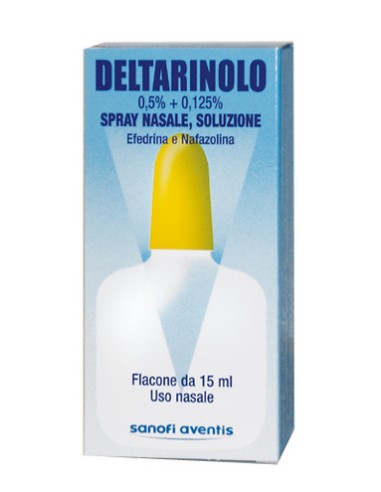Your cart
There are no more items in your cart
Nasal decongestants Deltarinol spray nas fl 15ml
 100% secure payments
100% secure payments





DELTARINOLO 5 MG/ML + 1.25 MG/ML NASAL SPRAY, DEVELOPMENT
active ingredients
100 ml of solution contain: Active ingredients: Ephedrine hydrochloride 0.500 g; Nafazoline nitrate 0.125 g. Excipients with known effects: methyl p-hydroxybenzoate and propile p-hydroxybenzoate. For the full list of excipients, see paragraph 6.1.Excellent
P-hydroxybenzoate, p-hydroxybenzoate propile, sodium edetato, sodium phosphate monobasic, phosphate sodium, sodium hydroxide, purified water.Therapeutic indications
Decongestant of nasal mucosa.Contraindications
Hypersensitivity to active ingredients or any of the excipients listed in paragraph 6.1, heart disease and severe arterial hypertension, acute glaucoma at a closed angle, hyperthyroidism, prostate hypertrophy, feochromocytoma, diabetes mellitus, pregnant women who are ascertained or presumed or breastfeeding. The drug is contraindicated in children under the age of 12. Do not administer during or in the two weeks following antidepressant medication therapy. For sportsmen: see point 4.4.Population
The DELTARINOLO should be applied every 3-4 hours up to 4 times a day; only one nebulization is sufficient. Strictly stick to the recommended doses. A higher dose of the product even if taken in a topical way and for a short period of time can give rise to serious systemic effects.Conservation
Store at a temperature not exceeding 25°C.Warnings
Protracted use of vasoconstrictors can alter the normal function of the mucosa of the nose and of the paranasal breasts, also inducing addiction to the drug. Repeating applications for long periods may be harmful. Carefully use in patients with kidney failure and, for the danger of urinary retention, in the elderly. The use, especially if prolonged, of topical products can give rise to phenomena of awareness; in this case it is necessary to stop treatment and, if necessary, to establish suitable therapy. However, in the absence of complete therapeutic response, within a few days, consult your doctor; in any case, treatment should not be protracted for over four days. In patients with cardiovascular diseases, especially in hypertensives, the use of nasal decongestionants must be subjected to the doctor’s judgement. Cardiovascular effects can be observed with the use of mymetic sympathic drugs, such as DELTARINOLO. There is some evidence from post-marketing data and published literature of rare cases of myocardial ischemia in association with the use of beta agonisti. Patients with pre-existing severe heart disease (e.g. ischemic cardiopathy, arrhythmia or severe heart failure) taking DELTARINOLO should be advised to contact your doctor if you experience chest pain or other symptoms of worsening heart disease. It must be paid attention to the evaluation of symptoms such as dispersion and chest pain, as they may be both of respiratory and cardiac origin. Strictly adhere to the recommended doses. The product, if accidentally ingested or used for a long time at excessive doses, may cause toxic phenomena. It must be kept away from the reach of children since accidental ingestion can cause marked sedation. It should not be used orally. Avoid liquid contact with eyes. Attention for sportsmen: the product contains substances prohibited for doping. A different intake is prohibited, by a posological scheme and by way of administration, from those indicated. For the presence of methyl-p-hydroxybenzoate and propile-p-hydroxybenzoate such as excipients, allergic reactions are possible, even delayed type. Ephedrine may be a substance subject to abuse.Interactions
The active ingredients contained in DELTARINOLO can interact negatively with antidepressant drugs. It is therefore contraindicated the administration of the product during or in the two weeks following antidepressant drug therapy. Ephedrine can reduce the pharmacological effectiveness of antihypertensive drugs; associated with clonidine, it can cause increased noradrenaline levels and increase blood pressure. If associated with NSAIDs, it can promote the occurrence of gastric mucosa lesions. Ephedrine can increase corticosteroid metabolism, reducing plasma levels. Asthmatic patients in treatment with such drugs should therefore avoid taking ephedra-based products. Ephedrine urinary excretion is dependent pH; acetazolamide, antacids, ammonium chloride and sodium bicarbonate are able to alkaline the urine, and consequently slow the elimination of ephedrine. The contemporary association of ephedrine with digoxin, phenylpropanolamin, cyclopropane and pseudoefedrine is associated with a greater risk of cardiovascular adverse events. Reserpine, causing norepinephrine depletion, can reduce the effectiveness of ephedrine. Theophylline can cause greater incidence of central and gastrointestinal adverse effects, which occur as a result of ephedrine administration. The association of ephedrine and caffeine can enhance the sympathomimetic effects of ephedrine.Effects
The product can determine locally phenomena of sensitization and congestion of bounce mucosa. After topical use of nafazoline, systemic effects such as nausea, headache and dizziness were reported. After administration of ephedrine, the most common adverse events reported are tachycardia, anxiety, restlessness and insomnia. Tremors can also occur, dry mouth, urination disorders, circulatory alterations at the end level, arterial hypertension, reflex bradycardia and heart arrhythmias. Reporting of suspicious adverse reactions The reporting of suspicious adverse reactions that occur after the authorization of the medicinal product is important, as it allows continuous monitoring of the benefit/risk ratio of the medicinal product. Healthcare workers are required to report any suspected adverse reaction via the national reporting system at: www.agenziafarmaco.gov.it/it/responsabili.Overdosing
In case of overdose, or accidental ingestion, arterial hypertension, tachycardia, photophobia, intense headache, chest oppression, psychiatric reactions and, in children, hypothermia and severe depression of the central nervous system with strong sedation requiring the adoption of adequate emergency measures.The use of the product in pregnant or pregnant women is contraindicated.
Source: Farmadati
- Deductible product
- Yes
012811016
29 Items
New
No reviews

